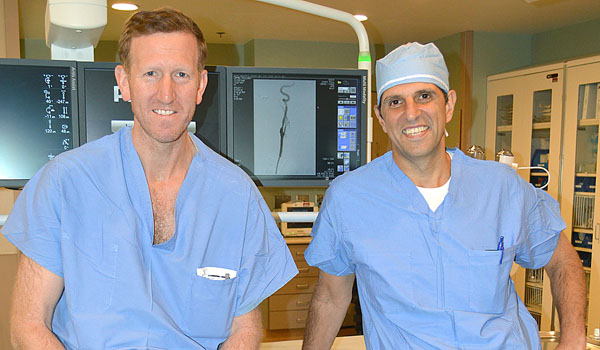Sisters Hospital introduces new breakthrough for treating carotid artery disease

Those who suffer from high blood pressure, diabetes or high cholesterol, and those who smoke are at increased risk for Carotid Artery Disease, or CAD. A leading cause of stroke, CAD is marked by plaque build-up in the blood vessels that supply blood and oxygen to the brain.
For many patients, vascular stenting, a procedure used to open narrow arteries, has been a successful treatment option for CAD. But for some high-risk patients, traditional stenting is not a viable treatment option, because the procedure itself can dislodge plaque in the blood vessels that feed the brain and cause a stroke.
A revolutionary new procedure called TransCarotid Artery Revascularization is changing the way doctors treat CAD, giving high-risk patients a less invasive, more effective treatment option that significantly reduces the risk of stroke.
Dr. Paul Anain and Dr. Roger Wolcott, vascular surgeons at Catholic Health's Sisters of Charity Hospital, have successfully performed this new procedure on a number of patients.
"While traditional vascular stenting has been the gold standard for treating carotid artery disease, it is not always a viable option for certain patients," according to Anain. "The TCAR procedure significantly reduces the risk of stroke in high-risk patients, giving us a safe and effective alternative to conventional treatment methods."
During the TCAR procedure, blood flow is temporarily re-directed away from the brain, reducing the risk of plaque becoming dislodged and reaching the brain. Once the stent is in place, the blood is filtered through a special system outside the body before normal blood flow is restored.
"We haven't seen an advancement as significant as this in the field of vascular surgery in quite some time and are extremely excited by what this means for patients with carotid artery disease who were not candidates for traditional stenting procedures," noted Wolcott. "We're now able to offer all of our patients the same opportunity for a successful outcome, with almost zero risk of stroke."
For more information on the TCAR procedure call Catholic Health System's Health Connection at 716-447-6205.




